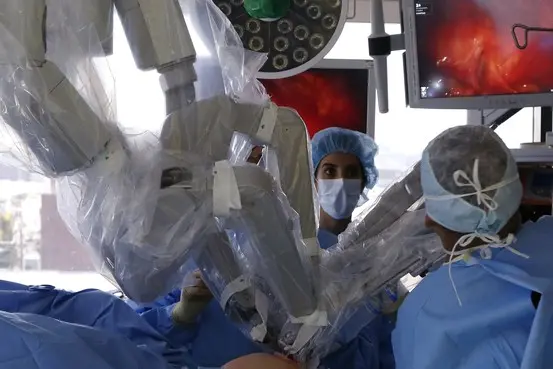- Home
- Medical news & Guidelines
- Anesthesiology
- Cardiology and CTVS
- Critical Care
- Dentistry
- Dermatology
- Diabetes and Endocrinology
- ENT
- Gastroenterology
- Medicine
- Nephrology
- Neurology
- Obstretics-Gynaecology
- Oncology
- Ophthalmology
- Orthopaedics
- Pediatrics-Neonatology
- Psychiatry
- Pulmonology
- Radiology
- Surgery
- Urology
- Laboratory Medicine
- Diet
- Nursing
- Paramedical
- Physiotherapy
- Health news
- Fact Check
- Bone Health Fact Check
- Brain Health Fact Check
- Cancer Related Fact Check
- Child Care Fact Check
- Dental and oral health fact check
- Diabetes and metabolic health fact check
- Diet and Nutrition Fact Check
- Eye and ENT Care Fact Check
- Fitness fact check
- Gut health fact check
- Heart health fact check
- Kidney health fact check
- Medical education fact check
- Men's health fact check
- Respiratory fact check
- Skin and hair care fact check
- Vaccine and Immunization fact check
- Women's health fact check
- AYUSH
- State News
- Andaman and Nicobar Islands
- Andhra Pradesh
- Arunachal Pradesh
- Assam
- Bihar
- Chandigarh
- Chattisgarh
- Dadra and Nagar Haveli
- Daman and Diu
- Delhi
- Goa
- Gujarat
- Haryana
- Himachal Pradesh
- Jammu & Kashmir
- Jharkhand
- Karnataka
- Kerala
- Ladakh
- Lakshadweep
- Madhya Pradesh
- Maharashtra
- Manipur
- Meghalaya
- Mizoram
- Nagaland
- Odisha
- Puducherry
- Punjab
- Rajasthan
- Sikkim
- Tamil Nadu
- Telangana
- Tripura
- Uttar Pradesh
- Uttrakhand
- West Bengal
- Medical Education
- Industry
Robotic-Assisted Hysterectomy More Costly but More Effective Than Open Surgery: Study

Researchers have found in a new study that Robotic-assisted hysterectomy (RAH) was more expensive yet more effective than open hysterectomy (OH). Future advancements in robotic surgery, including better patient selection, growth in outpatient procedures, and reduced equipment costs, may enhance its cost-effectiveness.
Hysterectomy for benign pathologies is one of the most common gynecological surgeries.
Over the past few years, robotic surgery has become an alternative to traditional surgery, but at a higher cost. Calculate the cost-effectiveness of robot-assisted hysterectomy (RAH) compared with open hysterectomy (OH) for the purpose of supporting public decision-making, as well as the additional cost per major postoperative complication (ClavienDindo score ≥ 3) avoided one month after surgery robotic versus open surgery.
Single-center retrospective study including patients operated on for benign hysterectomy at La Pitié Salpêtrière hospital between January 2016 and December 2019: 24 by robotic approach, and 54 by open surgery. Comparison of robotic surgery to open. Calculation of a cost-effectiveness ratio (ICER). Use of the propensity score inverse weighting method to ensure comparability of groups.
Results: Robotic surgery has a total cost of €7,704 at 1 month per patient compared to €5,301 for open surgery with an additional cost of € 828,621 per major postoperative complication avoided, longer operating time and an absence of significant difference in terms of complications and length of hospitalization. In terms of cost-effectiveness, RAH had a high probability to be more expensive and more effective than OH. In the years to come, we can expect a development of robotic surgery with rationalization of the practice, with appropriate selection of patients for robotic surgery, development of outpatient surgery and a reduction in the cost of the equipment.
Reference:
Richard Paul-Dehlinger, Alexandra Vappereau, Alicia Le Bras, Joana Oliveira, Amelia Favier, Jeremy BELGHITI, Catherine Uzan, Isabelle Durand-Zaleski, Geoffroy Canlorbe, Cost-effectiveness of robot-assisted total hysterectomy for benign pathologies compared to open surgery: a retrospective study with propensity score, Journal of Gynecology Obstetrics and Human Reproduction, 2025, 102989, ISSN 2468-7847, https://doi.org/10.1016/j.jogoh.2025.102989. (https://www.sciencedirect.com/science/article/pii/S2468784725000868)
Dr. Shravani Dali has completed her BDS from Pravara institute of medical sciences, loni. Following which she extensively worked in the healthcare sector for 2+ years. She has been actively involved in writing blogs in field of health and wellness. Currently she is pursuing her Masters of public health-health administration from Tata institute of social sciences. She can be contacted at editorial@medicaldialogues.in.
Dr Kamal Kant Kohli-MBBS, DTCD- a chest specialist with more than 30 years of practice and a flair for writing clinical articles, Dr Kamal Kant Kohli joined Medical Dialogues as a Chief Editor of Medical News. Besides writing articles, as an editor, he proofreads and verifies all the medical content published on Medical Dialogues including those coming from journals, studies,medical conferences,guidelines etc. Email: drkohli@medicaldialogues.in. Contact no. 011-43720751


